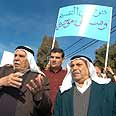
Demonstration in Ghajar (Archive photo)
צילום: אביהו שפירא
Shock in Ghajar: Israelis turned into refugees in Lebanon
Residents of northern village, about to be supervised by UN in unprecedented manner, remind State that 'we voted for Knesset, we paid taxed, and we have blue identity cards'
The village of Ghajar on the northern border has been subject to a feeling of uncertainty for almost seven years now. Since the Israel Defense Forces' withdrawal from Lebanon in May 2000, military forces have been stationed at the entrance to the village and are checking every vehicle entering or leaving.
About 2,100 residents live in Ghajar, some 1,550 of them in the northern part, the latter were surprised to hear in the media about the government's decision that they will be supervised by the United Nations Interim Force in Lebanon and that IDF soldiers will be stationed on the 'Blue Line.'
The village's secretary, Najib Hatib, was furious: "We have been living without a mother or father for almost seven years. Who will take care of brining food to the babies? Who will take care of repairing electricity and phone problems? Perhaps the UN, perhaps the Lebanese army?"
"Two residents have already paid with their lives after suffering from a heart attack, when the ambulance was not allowed to enter the northern part of the village. Animals are treated better than Ghajar residents," he said.
Ghajar residents engage in industry and agriculture in the Upper Galilee and Golan Heights communities. They are seeking to correct the historical mistake, and stress that their village was occupied by the IDF in 1967 along with the Golan Heights territories, and therefore they in fact belong to Syria, rather than to Lebanon. They believe that any negotiations with Beirut on their future are wrong.
The Israeli suppliers stop every day at the checkpoint located at the entrance to the village and unload their goods.
Hatib charged that "there it is like the Karni crossing. They throw the merchandise, and the residents go out to bring it to the village themselves, as if we were living in the Gaza Strip.
"We are good enough to pay income tax and taxes, but we do not receive services and compensation from the property tax for the war damages, because we are not defined as a village officially belonging to the State of Israel. Everyone here, as you know, has a blue identity card."
'It's simply a nightmare'
A., a resident of the northern part of the village, told Ynet that reality had become intolerable."Some 120 Knesset members were elected eight months ago, and the village residents went to the voting stations to vote for them. Today no one cares about us. Hizbullah was not and is not in the northern part of the village.
"We are not threatened, and we just want to live like any other citizen. Our children are suffering from anxieties. How would a child in Tel Aviv or in Haifa feel if he would wake up every morning, and on the way to school he would see tanks, concrete surfaces and soldiers in every corner? It's simply a nightmare."
The village residents called on the prime minister and defense minister "to come here for a couple of hours and see for themselves how some of the residents of the State of Israel are living at the end of 2006."
Today, more than ever, they hope that one of the leaders will regain his composure and will not turn them into refugees in the split Lebanon.
Several residents replied to the suggestion to apply the evacuation-compensation law to the village with a smile: "They are ready to evacuate us at any minute. Regarding the compensation, they promise to check that 'you are still not part of the State of Israel.' Is this serious?"










